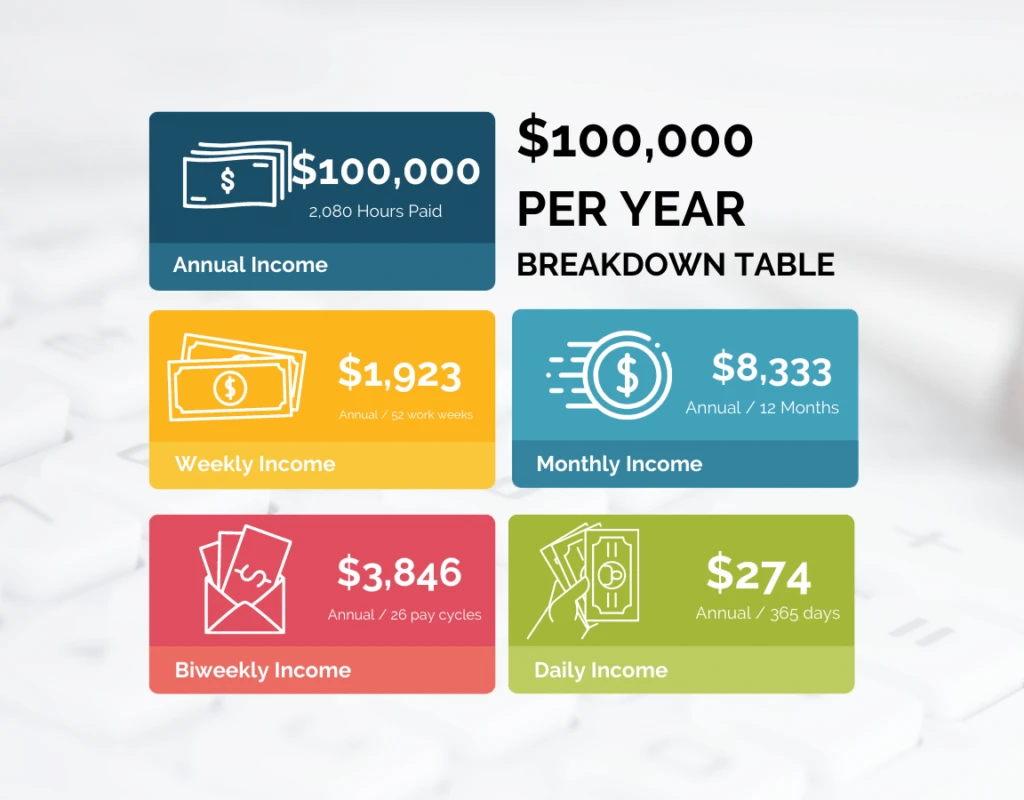Knowing your annual salary doesn’t tell you a lot. What you really want to know is how much you make per hour.
In other words, is the job worth your time for $48.08 per hour? It puts things into perspective and helps you decide what you want to do with your life.
So $100000 a year is how much an hour? We show you below.
Use our salary to hourly calculator to see your exact pay broken down!
Table of Contents
$100,000 a Year Is How Much a Month After Taxes?
If you find yourself wondering $100,000 a year is how much a month after taxes, consider this. Your after-tax income is what you bring home, aka the money you have to pay your bills and have fun. This is the most accurate picture of what you earn, but it’s nice knowing the gross amount an employer pays.
Here’s what $100,000 a year looks like after taxes on a monthly basis.
While each state has a different tax rate, we can cover the federal taxes you’d owe. Assuming you’re paid once a month, you’d make $8,333 per month BEFORE taxes. From that amount, you’d pay federal income tax, Social Security tax, and Medicare tax.
In our example, we’ll assume you don’t have any dependents. You’d pay around $1,431 in federal income tax, $517 in Social Security tax, and $121 in Medicare tax. Those numbers would change if you had dependents or you had any pre-tax deductions such as health insurance or 401K contributions.
$100,000 a Year Is How Much Biweekly?
If your employer pays you biweekly, you receive 26 paychecks per year. How much you receive depends on a few things. Obviously, your tax rate pays a role, but also the benefits your employer offers. Do you get paid vacation time or is it unpaid?
Your bi-weekly paychecks would be $3,846 before taxes and any other common deductions (pre-tax contributions). Bi-weekly paychecks occur every two weeks. Some months you may get two paychecks and some months you’d get three paychecks.
The same would be true if your employer paid you twice a month on the same days of the month, such as the 15th and the 30th of each month.
$100,000 a Year Is How Much a Week?
If your employer pays you weekly, you’d receive 52 paychecks per year. Before taxes and any other deductions/contributions, your paycheck would be $1,923 per week. You’d receive four or five paychecks a month, depending on the month as some months have five weeks in them.
$100,000 a Year Is How Much a Day?
Sometimes it’s nice to know how much you get paid per day. $100,000 per year is such an ambiguous number. It doesn’t tell you exactly how much your day is worth. On those tough days when your days drag, it may help to know how much you make per day.
In order to calculate this, you must know how many days you work a year. If you work a standard weekday 9 to 5 job, there are 260 working days in 2023. That means you make around $385 per day.
If you work fewer days, but more hours per day or you work more than five days per week, your amount would differ, but the average person makes $385 per day.
How Much Is $100,000 a Year per Hour?
If you find yourself wondering how much is $100,000 a year per hour, check this out.
Knowing how much you make per hour even if you get paid a salary is important. When you’re looking for a job, it helps to weigh the pros and cons of the job, including the opportunity cost of taking it based on its hourly rate.
If you work a standard 9 to 5 job on the 260 working days in 2023, you’d make $48.08 per hour. This is the same whether you get paid vacation or not – if you don’t get paid vacation, and you work the two weeks, you’d get paid. If you do get paid vacation, you get paid not to work.
Check Out This Related Article About Earning $50 an Hour
Now if the company pays you benefits, you may want to consider the financial benefit of them. For example, health insurance is a costly benefit. If your employer covers your insurance 100%, that’s a benefit to add to your hourly rate. The same is true if they offer a 401K match or any other financial benefits.
Even if you don’t receive the pay in hand – you get benefits in lieu of the money, which could help you decide if the job is the right choice.
$100,000 per Year Breakdown Table
Here’s a quick breakdown of what 100k a year looks like for the average person.

Tools for Living on 100k a Year
Track all of your account balances and your net worth in one place. Get access to a Retirement Planner, Fee Analyzer, Portfolio Checkup, Contribution Calculators, and so much more with, Empower!
- Early pay and cash advances
- Easy account linking
- Earn cash back
- Budgeting tools to monitor spending and expenses
- An inexpensive way to borrow funds
- The amount borrowed is non-customizable
- Requires a subscription
- Low APY
- Need an Empower card to receive free and instant cash advances
Find the best paying full time & part time remote work from home & flexible jobs available online!
Both employee & freelance positions available from some of the biggest companies!
- Advanced and easily refined job searches
- Saves time for job seekers
- FlexJobs screens the jobs they post
- 30-Day money back guarentee
- Requires a membership fee
- Salaries are not always listed with the job post
- Some jobs are not actually remote
Get Paid to shop! Rakuten is a free and easy way to earn cash back and receive special bonus offers from over 3,500+ stores. All you need to do is join, shop, and get paid.
- Easy Registration
- Free to use
- Most major retailers partner with Rakuten
- Welcome bonus offers
- Only US and Canadian residents can join
- Low earning potential
How to Make 100k a Year
Today, it’s easier than ever to make $100,000 a year or more if you start a side gig or two. Depending on how busy you want to be, you can add jobs like Uber or Lyft driver, freelance writer, Instacart shopper, or website designer to your repertoire.
If you want something more passive, you can answer surveys on Swagbucks, use cashback sites like Rakuten, or even invest your money. Dividend stocks, ETFs, and even online high-yield savings accounts pay you a little money and every dollar adds up!
If you find yourself looking for jobs that pay 100k a year, and you don’t have a college degree, look at the following job. Of course, the list is endless, and now that you know the average hourly salary to make $100,000 a year, you can determine which jobs will get you where you want to be.
Business Owner
Business owners aren’t tied to a specific annual salary from an employer. The more they grow their business, the more they earn, so it’s possible or business owners to earn $100,000 or more depending on their industry. Business owners work hard and may not work the typical Monday – Friday schedule, but they benefit from working for themselves and not answering to anyone.
Real Estate Broker
Real estate brokers are in a great position to make $100,000 annually. Real estate brokers help buyers and sellers with their real estate transactions. They work on commission and can make several thousand dollars on one sale. The potential for real estate brokers is high, but the tradeoff is they work odd hours, usually more nights and weekends than daytime, to be available when clients need them.
Sales Consultant
Sales consultants have a great chance of making $100,000 a year, especially when they’re established. Whether you sell pharmaceuticals, cars, or business software, there’s a need for salespeople in every industry. Sales consultants typically work on commission, but some companies pay a small base salary plus any commission earned.
Air Traffic Controller
Air traffic controllers have stressful jobs, as they handle all air traffic coming in and out of the airport. Therefore, air traffic controllers need a college degree and experience working with computer software, radar, and many moving vehicles and people, keeping everyone safe.
Plumber
Plumbers are tradespeople that work hard for their money. First, they must go to trade school, but then they can start working immediately, making a great annual salary. It doesn’t take long for plumbers to work up to $100,000 a year, especially if they start their own plumbing business.
Computer Programmer
Computer programmers have a niche skill that many people don’t have and every company needs. They help companies in all industries keep their computers running, problem-solve issues, and create new programs. As a result, computer programmers quickly climb the ladder, making as much as $100,000 a year only a few years out of school.
Factors That Affect Your Take-Home Pay
Even if you make $100,000 a year, that’s not how much you’ll take home. Certain factors, such as income taxes, vacation time, and insurance, affect your take-home pay.
Cost of Living
If you work for a company that offers COLA benefits, you may get a raise or a lump sum payment if the cost of living increases a certain amount. When the cost of living changes, your money has less purchasing power, making it harder to make ends meet. COLA benefits aren’t common, but consider yourself lucky if your company offers them.
Taxes
All employees pay taxes at the federal, state, and local levels. Not all states charge income tax, so if you live in a state that doesn’t charge it, you’ll keep a larger part of your paycheck. However, everyone pays federal taxes, including FICA, which covers your Medicare and Social Security benefits when you retire.
PTO
Whether you have PTO (paid time off) determines if your vacation days affect your paycheck. If you have PTO, you can take your vacation days and have the same paycheck you normally receive. However, if you don’t have PTO, your check will be less on the weeks you take days off.
Insurance
If your employer offers group insurance, they’ll take the monthly premiums from your gross pay (before taxes). Some employers cover an employee’s premium, but most don’t cover insurance for dependents. Since group insurance is typically less expensive than individual insurance, it’s a good benefit to take advantage of even though it lowers your take-home pay.
Additional Ways to Boost Your Annual Salary
Earning $100,000 a year is a great salary, but if you want more to reach other financial goals, here are some ways to get it.
Negotiate a Raise
Even though you make $100,000 a year, you might feel like you’re worth more. If you know other companies in the area pay more for the same position or feel like you go above and beyond for your job, you might ask for a raise.
It can be nerve-wracking to ask for a raise, but if you ask when your boss has time to listen and prepare yourself with reasons and data to support your reasons, you might find that your employer agrees.
New Job
$100,000 a year is a high salary; not all employers can go beyond that. So if you’re tapped out at your current employer, you might consider finding a new job. However, it could take some time to find another job that pays just as much, so have patience and try to use your paid time off for the interviews so you don’t miss out on any pay.
New Career
If you know you can’t make more than $100,000 in your industry, you might consider a new career. However, at the $100,000+ level, you’ll likely need to return to school to get your Master’s degree or additional training to get a job that pays over $100,000.
Side Hustles
Side hustles can help you increase your income and can be fun. You can work a side hustle in your industry, such as consulting in your free time or doing something different. However, if you want to step outside your comfort zone or do something less stressful, find a freelance gig or even a side job you can do that has nothing to do with your industry.
Passive Income
If you have money to invest, you can create passive income. You may earn dividends, interest, or capital gains that increase your income, and you don’t have to work for it. But if investing isn’t your thing, you can make passive income by creating online courses, writing a book, or taking stock photos and selling them. You do the work initially but then continually earn money each time someone new buys your products.
Sample Budget for $100,000 a Year
Most families can live on $100,000 yearly, even if they have children. However, it’s always a good idea to follow a budget to ensure your ends always meet.
Here’s how we like to budget.
- 50% of your income should cover all fixed expenses such as housing, medical expenses, insurance, transportation, food, and clothing
- 20% of your income should cover your non-essentials or fun spending
- 20% of your income should go to savings, retirement, or debt payoff
- 10% of your income should cover charitable giving
$100000 a Year is How Much an Hour: FAQs
Can I Live Off $100,000 a Year?
Most people can easily live off $100,000 a year, even if they have dependents. Of course, it depends on the cost of living in your area and your spending habits, but $100,000 is usually more than enough to live.
Can You Make $100,000 a Year Without a Degree?
It is possible to make $100,000 a year without a degree. Plumbers, business owners, and real estate brokers are just a few ways you can make $100,000 annually without a degree.
What’s the Total Number of Working Days in 2023?
There are 260 working days in 2023.
How Do You Calculate Hourly Rate From Annual Salary?
You might want to know how much your $100,000 pays you per hour. For example, if you work 40 hours a week, 52 weeks a year, divide $100,000 by 52 weeks and divide that number by 40 hours. If you work different hours or weeks, change the numbers accordingly.
Is $100000 a Year a Good Salary?
If you wonder is $100,000 a year is a good salary, consider this. The minimum wage in the United States is $7.25 an hour. If you make $100,000 a year, you make $48.08 per hour – you make more than 6 times the minimum wage.
Now let’s look at the average weekly salary. The Bureau of Labor Statistics states that the average American makes $865 a week working full-time. That comes out to $44,980 per year. If you’re making $100,000 you are above the average American. Depending on your financial goals, you may or may not consider adding additional streams of income.
Samantha Hawrylack is a personal finance expert and full-time entrepreneur with a passion for writing and SEO. She holds a Bachelor’s in Finance and Master’s in Business Administration and previously worked for Vanguard, where she held Series 7 and 63 licenses. Her work has been featured in publications like Grow, MSN, CNBC, Ladders, Rocket Mortgage, Quicken Loans, Clever Girl Finance, Credit Donkey, Crediful, Investing Answers, Well Kept Wallet, AllCards, Mama and Money, and Concreit, among others. She writes in personal finance, real estate, credit, entrepreneurship, credit card, student loan, mortgage, personal loan, insurance, debt management, business, productivity, and career niches.




